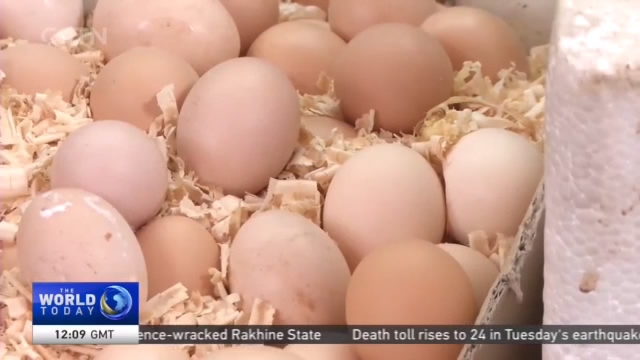
12:16, 12-Aug-2017
Europe Egg Scandal: Hong Kong pulls tainted Dutch eggs from shelves

A widening contaminated eggs scandal within the Europe Union has now spread to Hong Kong, with eggs confirmed to have been tainted with unsafe levels of insecticide. CGTN's Mao Dan reports.
Contamination continues to spread. Hong Kong is the latest confirmed hit by the Europe eggs scandal. The Hong Kong Centre for Food Safety revealed last week that two tested samples of Dutch eggs contained excessive level of Fipronil, a highly toxic pest control chemical banned from the production of food. It has asked shops to remove the products from shelves, and instructed the importer to initiate a recall.
HONG KONG RESIDENT I will check the product's origin and place of production. If the food products are from tainted areas, I will not buy them. HONG KONG RESIDENT I am concerned now. I certainly will not have Dutch eggs. HONG KONG RESIDENT I've seen the news. Now when I go to buy chicken, I will check where the product was produced to see if it's from affected areas. HONG KONG RESIDENT After hearing this news there is no way I will eat these eggs. They could be toxic, I will definitely avoid them.
The local food safety watchdog said eggs originally found toxic by the European Commission were not imported to Hong Kong. That would indicate the two tested samples were from a new batch of affected eggs. Local supermarket chain ParknShop said it was very concerned, and pledged to closely communicate with the Centre for Food Safety and to follow its instruction.
Its competitor, Wellcome, went further and claimed its customers could obtain a refund on the purchase of eggs from Germany, Belgium and the Netherlands. Official statistics show, in the first five months of this year, Hong Kong imported about 927-thousand eggs from the Netherlands.
The Hong Kong Centre for Food Safety said no new sample of contaminated eggs were found over the past week, but it has taken precautionary measures. All eggs imported from the Netherlands, Germany and Belgium will be held for testing before they can be released to the market. Mao Dan for CGTN, Hong Kong.

SITEMAP
Copyright © 2018 CGTN. Beijing ICP prepared NO.16065310-3
Copyright © 2018 CGTN. Beijing ICP prepared NO.16065310-3